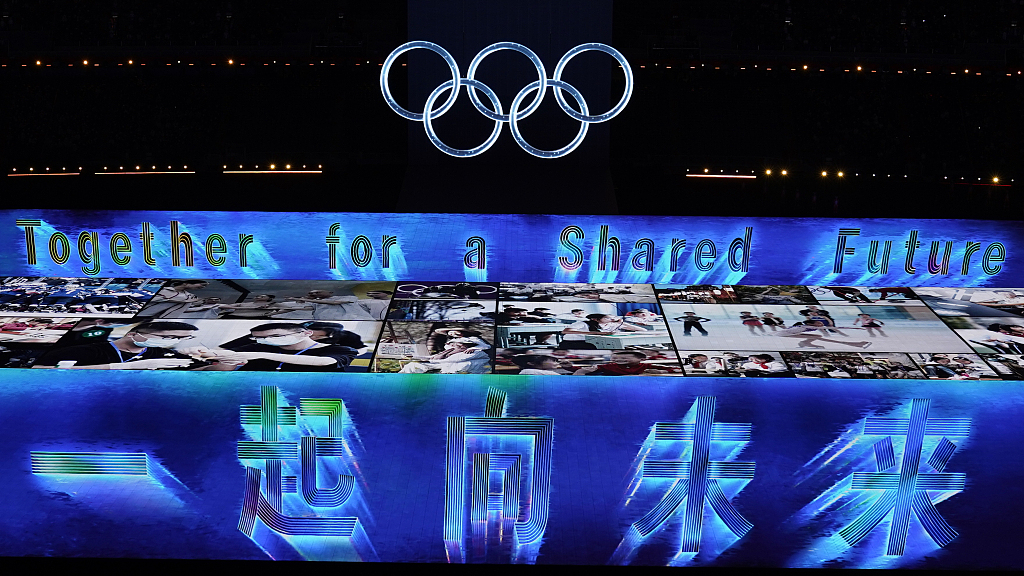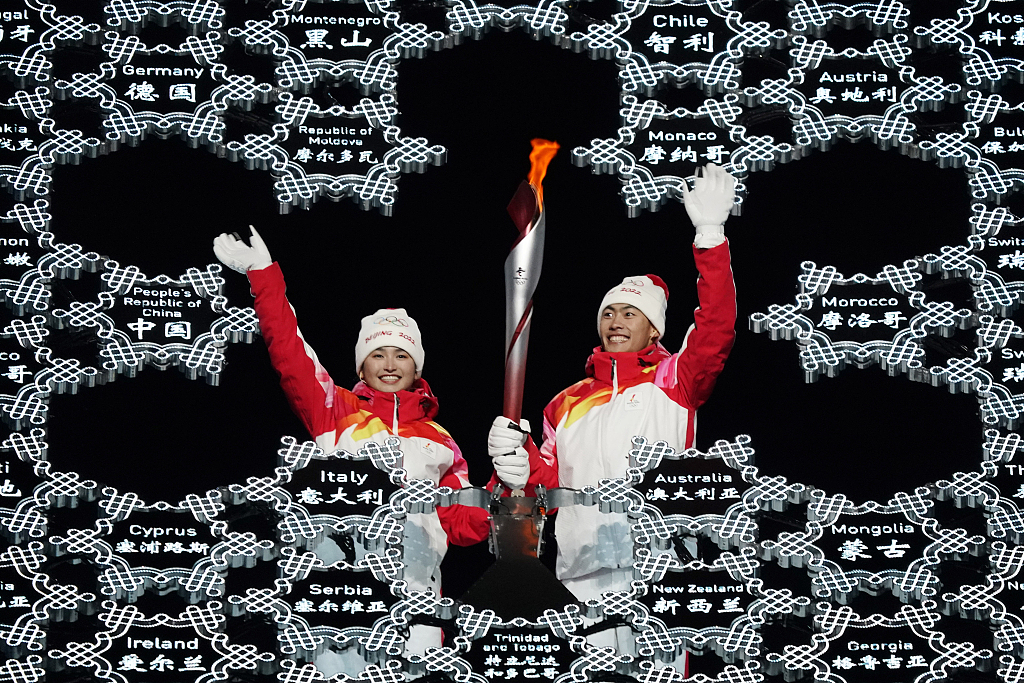
Actors perform during the opening ceremony of the 2022 Winter Olympics, Beijing, China, February 4, 2022. /CFP
Actors perform during the opening ceremony of the 2022 Winter Olympics, Beijing, China, February 4, 2022. /CFP
Editor's note: Anthony Moretti is an associate professor at the Department of Communication and Organizational Leadership at Robert Morris University. The article reflects the author's opinions and not necessarily those of CGTN.
The 2022 Winter Olympics are now in the history books. Athletes from almost 30 countries and regions return home with gold, silver or bronze medals, and the competitors from all 91 delegations to Beijing will have a lifetime of memories to share with family and friends.
There is only one conclusion we can draw about these Games: They were a phenomenal success. International Olympic Committee President Thomas Bach admitted the obvious during the closing ceremony on February 20, when he called the Beijing Games "truly exceptional."
However, a host of Western-based news organizations – and even certain sports officials – want us to believe something very different.
And that is very sad.
We must realize many Western news agencies had placed the Chinese in a no-win situation from the minute the Games began. Any mistake, any health scare, any person being treated unfairly would be used as evidence that China could not do what it had promised: stage the Games while ensuring the highest level of safety for every athlete, referee and official.
The script had already been written: If the organizers did pull off more than two weeks of events involving close to 3,000 athletes and without a single mistake, there would be no round of applause in the West; instead, Western news audiences would be told stories suggesting the Games were poor, dull or somehow lesser than they should have been.
Neither you nor I should accept that.
Here are just a few examples of the negative reporting that greeted news readers in the U.S. and Europe at the conclusion of the 2022 Olympics:
The Washington Post stated that the Games ended after more than two weeks of a "carefully enforced script, demonstrating China's prowess in sports, technology and social control, while projecting an uncompromising attitude toward its many diplomatic disagreements with democratic nations."
The Boston Globe informed its audience that the "five Olympic rings might as well have been part of a chain link fence that walled off the athletes from both the city and the world for a forbidding fortnight. These were Games that were marked by anxiety, by isolation, by controversy and, finally, by relief that they were over."
The Guardian insisted that "these Games will linger in the memory for other reasons, too – in particular the extraordinary closed-loop system, which meant that athletes, officials and journalists were not allowed any interaction with mainline China."
Finally, Deutsche Welle claimed that "(s)trictly shielded and constantly tested, the number of coronavirus cases was kept to a minimum.""Now everyone has had enough and is looking to get out of here," said Germany's Alpine Skiing Director Wolfgang Maier on the penultimate day of the competitions.

Olympic torch is brought into the National Stadium by Chinese athletes Dinigeer Yilamujian and Zhao Jiawen during the opening ceremony of the 2022 Winter Olympics, in Beijing, China, February 4, 2022. /CFP
Olympic torch is brought into the National Stadium by Chinese athletes Dinigeer Yilamujian and Zhao Jiawen during the opening ceremony of the 2022 Winter Olympics, in Beijing, China, February 4, 2022. /CFP
If that name sounds familiar, it should. Maier demonstrated a terrible lack of judgment – but faced almost no criticism – when he said just days before the Olympics started that he feared unnamed people in China might alter coronavirus tests so that athletes the Chinese did not like could be taken "out of circulation" because there is "no protection for the athletes" who are "defectively exposed to despotism" while in China.
I want to ask Maier if he would like to retract that baseless and unprofessional claim now that not a single person was treated that way. I also want to ask mainstream news agencies throughout the West why they embraced this foul rhetoric without demanding evidence.
In short, too many Western news organizations deliberately sought to create a narrative that smacked of the Cold War era: A dark and distrustful nation might cheat in order to win or to silence its critics. Sixteen days of events and there was not one instance – not one – to bolster that claim.
But good luck finding enough journalists willing to do what should be done: Commend the Games' organizers for crafting an elaborate system that would keep athletes, officials, journalists and the Chinese people safe.
Anything less than the "closed loop" system that defined these Games would have been a dereliction of duty; under no circumstances would it have been appropriate for athletes to carry on as if these Olympic Games were being conducted in normal times.
Likewise, it would have been potentially dangerous for the Chinese people to interact with people from 90 different places around the globe, many living in countries where legitimate restrictions on public behavior were not in place.
The Chinese government and the Games organizers had two primary goals over the past couple of weeks: Make the 2022 Winter Olympics as enjoyable as possible for the athletes and officials while ensuring the health of the Chinese people.
They did both.
For that, they owe no one an apology, most especially Western journalists and certain skiing officials who wanted us to fear the worst would happen during the Games.
(If you want to contribute and have specific expertise, please contact us at opinions@cgtn.com.)

